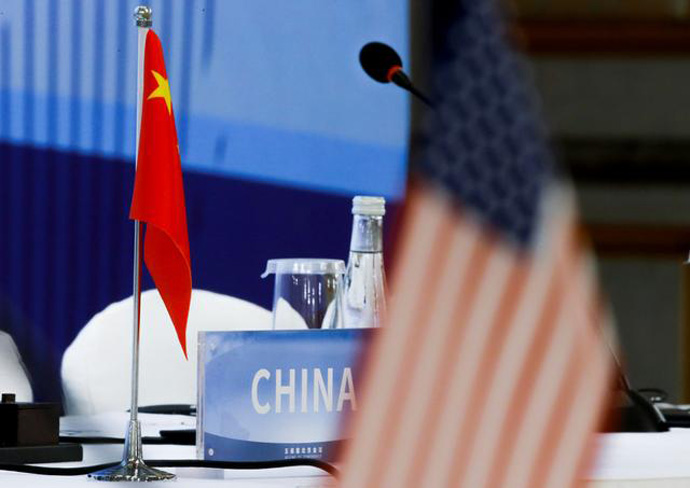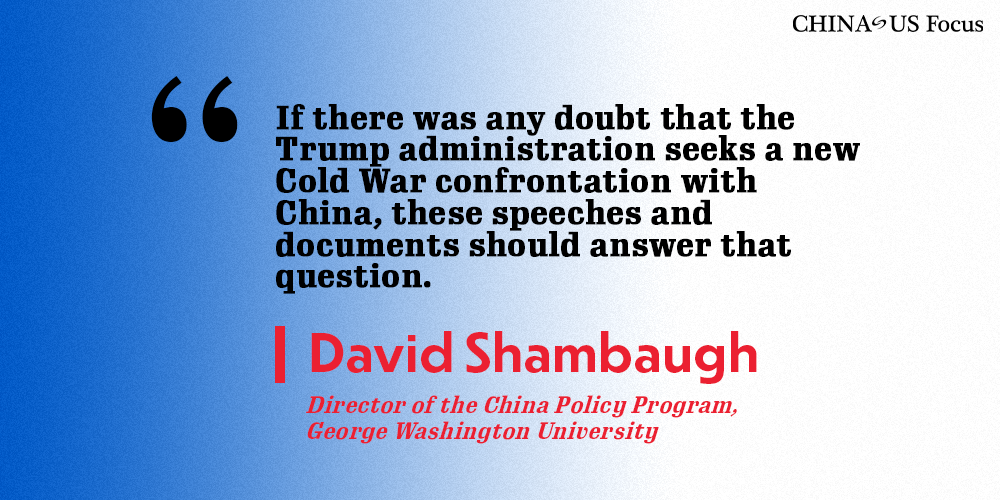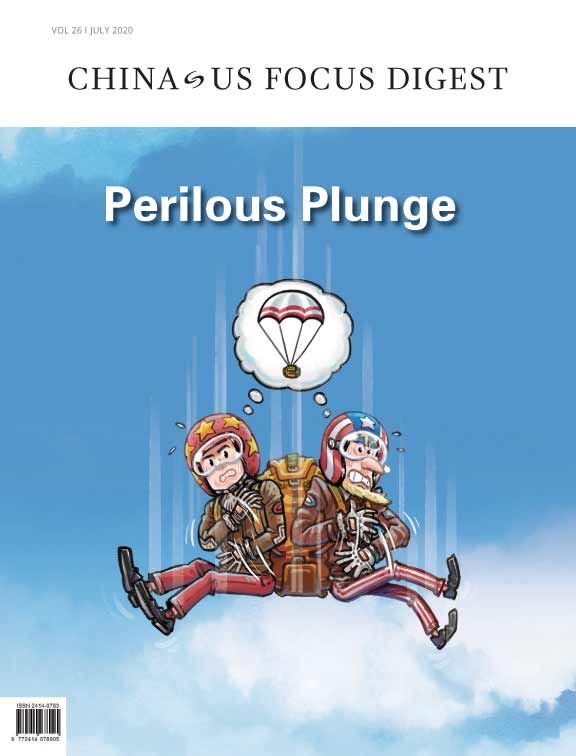
Since May, the Trump administration has set forth a systematic set of speeches and documents outlining what it sees as numerous areas of China’s “malign behavior,” and identifying policy responses to be taken to counter it. Taken together, they add up to the most comprehensive articulation of official American government thinking about China in many years. The Chinese side would do well to read carefully and reflect seriously on the bill of indictments set forth in these speeches and documents—and not simply brush them off as examples of the “cold war mentality.” Perceptions become realities and, even if not entirely accurate, they offer a systematic summation of how many in Washington (including in Congress) currently think about China and US-China relations.
What have these Trump administration speeches and documents said? Readers are encouraged to read each in the original and in their entirety, but here is a quick summary of each.
The opening salvo was the extraordinary policy document “United States’ Strategic Approach to the People’s Republic of China,” released by the White House on May 26, 2020. It was extraordinary both because of what it actually said, and because few previous administrations actually put in print similar comprehensive statements of policy. It took specific aim at the Chinese Communist Party, rather than the PRC as a nation or the Chinese people. In this and all the other Trump administration statements, it is the CCP that is the specific target of its ire. The policy statement views the CCP as subversive of American values, laws, and institutions, as well as the international system.
As with other speeches, the “Strategic Approach” also claimed that the policy of “engagement” with China—carried out over the past eight administrations—has been a failure. A failure to do what? A failure to move China in more liberal directions politically, socially, and economically (some notable Americans and former officials sharply dispute and reject that this was ever the purpose of engagement). The document explicitly describes the US-China relationship now as one of “strategic competition,” and it then elaborates a litany of China’s and the CCP’s alleged actions in which US “national interests” are being compromised in the areas of economics, values, and security. The document then concludes with a series of actions the administration is taking to “advance American interests” and counter the CCP’s “malign influence.”

The second step in the series of criticisms of China was a speech by National Security Advisor Robert O’Brien in Phoenix, Arizona on June 24 entitled “The Chinese Communist Party’s Ideology and Global Ambitions.” As the title suggests, this speech took aim squarely at the CCP’s adherence to Marxism-Leninism as a political ideology, and clearly framed US-China relations as a clash of ideologies reminiscent of the Cold War. Equating Xi Jinping specifically with Josef Stalin, O’Brien said: “As interpreted and practiced by Lenin, Stalin, and Mao, communism is a totalitarian ideology…. The Chinese Communist Party seeks total control over the people’s lives. This means economic control, it means political control, it means physical control, and, perhaps most importantly, it means thought control.” The speech then catalogued numerous examples of how the CCP is trying to control information outside of its borders all around the world, and he asserted that Xi Jinping’s “Community of Common Destiny for Mankind” is a camouflaged blueprint for global domination. The speech concluded with a list of steps the US is taking to push back against the CCP and PRC in seven areas.
The third salvo was a speech by FBI Director Christopher Wray on July 7, entitled “The Threat Posed by the Chinese Government and the Chinese Communist Party to the Economic and National Security of the United States.” As would be expected from an FBI Director, the speech focused on clandestine espionage threats and counterintelligence. In his speech, Director Wrap claimed that he would provide “more detail on the Chinese threat than the FBI has ever presented in an open forum.” Wray did indeed offer multiple examples. Some of these have previously been reported in the media, some were new. He also noted that the sheer volume of PRC intelligence activities has now reached the point where the bureau is opening a new counter-intelligence investigation concerning China “every 10 hours.” This dimension of malign Chinese activities affects commercial businesses, academia, state and local governments, national data bases (government and private), illicit technology theft, recruitment of informants and spies, and other illegal actions.
Next came Attorney General William Barr, who offered “Remarks on China Policy” on July 16. Barr reiterated many of the same themes and accusations as Wray, particularly concerning commercial espionage. But he went further to chastise Hollywood and American corporations for self-censorship and capitulation under China’s pressure: “Hollywood is far from alone in kowtowing to the PRC. America’s big tech companies have also allowed themselves to become pawns of Chinese influence,” asserted the Attorney General. He further claimed that: “The Chinese Communist Party also seeks to infiltrate, censor, or co-opt American academic and research institutions.” Barr’s speech seemed to be aimed as much at American institutions as at China.
Click to read China-US Focus Digest
The final, and most recent, broadside in this series was Secretary of State Mike Pompeo’s speech “Communist China and the Free World,” delivered on July 23, 2020 at the Nixon Presidential Library in California. Claiming to be the wrap-up to the series of speeches (Pompeo also gave two other speeches in Copenhagen and Brussels on June 19 and 24 respectively), the Secretary of State actually said little he had not said before in previous venues and were contained in the O’Brien, Wray, and Barr speeches. It was more of a recantation and summation than an original contribution.
Pompeo again criticized past “engagement” policies, again took specific aim at the CCP, and framed the relationship very much in Cold War redux terms (as evident in the title of the speech). John Foster Dulles could have written it. Pompeo hurled multiple accusations and insults at China—saying, for example, that “China is not a normal law-abiding nation,” that Xi Jinping is a “true believer in a bankrupt totalitarian ideology,” and that CCP ideology is one that holds “a decades-long desire for global hegemony of Chinese communism.” Channeling former President Reagan’s reference to Soviet arms control treaties, Pompeo claimed that in the case of China the American assumption should be “mistrust and verify.” He also insinuated, not so subtly, that only regime and system change in China will suffice to make China what he described as a “normal country.” In doing so, Pompeo called for forging a multinational and multilateral effort to meet “this challenge.” “If the free world doesn’t change, communist China will surely change us,” Pompeo concluded.
Although China’s government will never do so, it would be a useful exercise in candor and bridge-building if Beijing were to offer an equally comprehensive and honest point-by-point set of responses to the Trump administration’s indictments. It would also be interesting to read a parallel set of critiques of specific American behavior which China finds so offensive. Only by airing out such grievances publicly can each side (and the world) see things the way the other does—and that, in turn, should form the basis of blunt and candid conversations. Only on the basis of such frank and honest discussions can each sides’ positions be clarified, responded to, and some differences narrowed. Two adversarial parties need not have mutual trust to engage in such exchanges—but it is only on the basis of such candor that real understanding can be achieved. The goal is not to build trust, but to forge realistic understanding.
If there is any doubt that the Trump administration seeks a new Cold War confrontation with China, these speeches and documents should answer that question. The outstanding questions now are: how will Beijing respond and how might a Biden administration be different?

